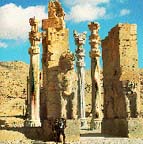 "While modern-day archaeologists rarely have to confront lava pits, animated stone statues or the undead, they increasingly contend with entire peoples, becoming the frontline troops in the clash of civilizations. As empires and superpowers fade, cultural, religious and nationalistic movements have been growing in strength — and they are looking to archaeology to give them the validation of history, said Philip Kohl, editor of the book Nationalism, Politics and the Practice of Anthropology."
"While modern-day archaeologists rarely have to confront lava pits, animated stone statues or the undead, they increasingly contend with entire peoples, becoming the frontline troops in the clash of civilizations. As empires and superpowers fade, cultural, religious and nationalistic movements have been growing in strength — and they are looking to archaeology to give them the validation of history, said Philip Kohl, editor of the book Nationalism, Politics and the Practice of Anthropology."
Jerusalem is far from the only place in the world where these sort of disputes have occurred.
Archaeologists point to the widespread destruction of holy sites during the Bosnian war, and the efforts of each side to erase any trace of the other's connection to the land. Serbs consider Kosovo the birthplace of their civilization because the area was once the seat of the Serb Orthodox Church and the site of a 1389 defeat at the hands of the Ottoman Turks. Albanians trace their ties to the area to another people who lived in the Balkans as far back as 1200 B.C.
However, archaeology does not provide a guarantee to political lineage. In 1971, the last Shah of Iran held an immense celebration on the ruins of Persepolis, the ancient capital of Persia, to celebrate 2,500 years of the Persian monarchy. But, less than 10 years later, the monarchy collapsed with the advent of the Iranian revolution.
No comments:
Post a Comment